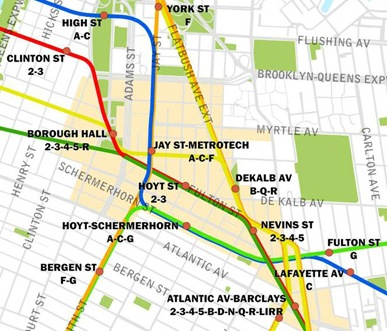
The proposed reduction of parking minimums in Downtown Brooklyn, though seriously insufficient, is good news for housing affordability and environmental sustainability in New York City. But it's terrible news for those hoping to see broader reforms of New York City's parking requirements. If the Department of City Planning felt so politically constrained that it could only halve parking requirements for market-rate units in Downtown Brooklyn, it's hard to see any meaningful change happening in the rest of the city -- unless residents and activists get serious about advocating for real parking reform.
As Streetsblog reported yesterday, the Department of City Planning considered eliminating parking requirements entirely in Downtown Brooklyn, but opted against it for a single reason: undefined "community input." By DCP’s own admission, under the new proposal many large Downtown Brooklyn developments would still be required to build more parking than they want or need. Parking minimums would be eliminated entirely for affordable housing.
That disappointing outcome took place among what will surely be the most favorable conditions for parking reform in the city. Thirteen subway lines stop in Downtown Brooklyn, more than even exist in any other American city. The powerful local business community has been pushing for a reduction or elimination of the minimums for years, and the local City Council member, Steve Levin, had expressed support for such a move. Significantly fewer Downtown Brooklyn residents own cars than in the surrounding community district, much less the borough or city as a whole.
If given all those advantages DCP was only willing to cut parking minimums in half, what could they possibly propose for neighborhoods like Harlem, Williamsburg, or Long Island City, much less the broad swath of neighborhoods being studied in the department's "inner ring" parking study?
There's still a chance to show the Department of City Planning that it can think bigger, though, in Downtown Brooklyn and elsewhere. Community Board 2, Borough President Marty Markowitz and the City Council all must weigh in on the proposal, and public hearings will be held by the community board, council, and City Planning Commission. These venues offer an opportunity to show that the preponderance of "community input" is pushing for the elimination of parking minimums, not their retention.
More fundamentally, though, City Planning Director Amanda Burden and her bosses, Deputy Mayor Robert Steel and Mayor Bloomberg, need to show a little spine in the face of motorist demands for more parking. This administration, not one generally known for its timidity, is falling far behind its peers on parking policy. Across the country, cities are eliminating or reducing parking minimums citywide.
Washington D.C.'s rezoning would entirely eliminate parking minimums for all but the very least transit-accessible neighborhoods. D.C. planning director Harriet Tregoning has explicitly urged New York City to follow the lead of the nation's capital.
Elsewhere on the Northeast Corridor, Boston is flipping neighborhoods from having parking minimums to parking maximums as it rezones each one, and urging individual developers to convert entire floors of parking to housing. Philadelphia's new comprehensive rezoning includes a number of new zones without parking minimums, including rowhouse districts, and lowers minimums in transit-oriented development overlay zones.
Buffalo may be facing very different economic challenges than New York City, but it's still the second-largest city in the state. Under Mayor Byron Brown's proposed rezoning of the city, parking minimums would be scrapped citywide, "instead allowing the market to respond to changing lifestyle preferences and a range of transportation choices," [PDF].
In San Francisco, new neighborhoods are exempted from parking minimums every year. "A broad swath of the city, reaching from Downtown into SoMa, Chinatown, Telegraph Hill, Mission Bay, Tenderloin, Hayes Valley, Duboce Triangle, and parts of the Mission and Potero Hill, has no minimum parking requirements," according to local advocacy group Livable City. There are also no parking minimums for housing dedicated for seniors, people with disabilities, or low-income residents.
Another common approach, particularly in the Pacific Northwest, is to zero out parking minimums near transit lines. Portland doesn't require any parking for projects within 500 feet of any transit line, including buses, with 20 minute peak hour service. For comparison's sake, click here for a map of Brooklyn bus routes with ten-minute off-peak service and see how much of the borough would be covered under this standard. Seattle Mayor Mike McGinn has proposed eliminating parking minimums within a quarter-mile of frequent transit, though the Seattle City Council may walk that back to allowing a 50 percent reduction in parking minimums near transit.
In this context, merely lowering Downtown Brooklyn parking minimums and leaving the rest of the city more or less untouched just doesn't pass muster. Downtown Brooklyn must be the starting point for widespread parking reform. Based on the political fearfulness on display, though, it looks as if it might instead be the end.





